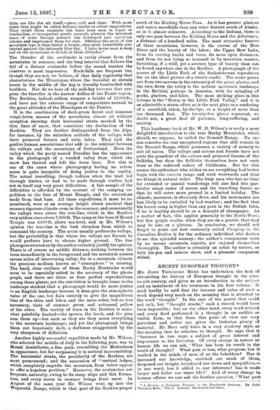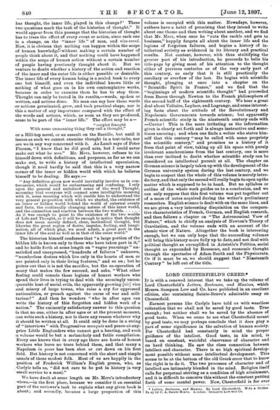RECENT EUROPEAN THOUGHT.*
Mn. JOHN THEODORE MzEz has undertaken the task of chronicling the history of European thought in the nine- teenth century, and gives us an introduction to the subject and an instalment of his treatment in his first volume. It need hardly be said that the interest and value of such a. work depend very much on the meaning that is attached to. the word "thought." In the case of the parrot that could not talk, but "thought stacks," such a record would have been impossible ; but on the other hand, every word uttered and every deed performed is a thought in an audible or visible form, so that from this point of view our very garrulous and active age gives the historian plenty of material. Mr. Merz only hints in a very shadowy style at the meaning that he attaches to thought. He says that it "becomes in two ways a subject of great interest and importance to the historian. Of every change in nature or human life we can ask, What has been its result in the world of thought? What gain or loss, what progress, has it worked in the minds of men, of us the beholders ? Has it increased our knowledge, enriched our stock of ideas, deepened our insight, broadened our views and sympathies,— in one word, has it added to our interests has it made larger and faller our inner life?' And of every change in human affairs we can ask the further question, What part • A History of European Thought in the Nineteenth Century. By Jolla Theodore Herz. Vol. I. London : Blackwood and Sons.
has thought, the inner life, played in this change ? ' These
two questions mark the task of the historian of thought." It would appear from this passage that the historian of thought has to trace the effect of every event or action, since each one is a change, on the "inner life" of man, and vice-versci.
Now, it is obvious that nothing can happen within the scope of human knowledgwithout making a certain number of people think about it, and that nothing could have happened within the scope of human action without a certain number of people having previously thought about it. But we venture to doubt whether a history of the action and reaction of the inner and the outer life is either possible or desirable. The inner life of every human being is a sealed book to every one but himself, and even the individual knows little or nothing of what goes on in his own contemplative works, because in order to examine them he has to stop them.
Thought can only be tested in its results,—words, spoken or written, and actions done. No man can say how these words -or actions germinated, grew, and took practical shape, nor is this a matter of any importance compared with the effect of the words and actions, which, as soon as they are produced, -cease to be part of the "inner life." The effect may be a-
" couplet fraught
With some unmeaning thing they call a thought,"
or a Hill-top novel, or an assault on the Bastille, but until it issues as such we cannot examine thought in a test-tube, nor are we in any way concerned with it. As Lamb says of Peter Pierson, "I know that he did good acts, but I could never make out what he was." Mr. Merz, however, refuses to tie himself down with definitions, and purposes, as far as we can make out, to write a history of intellectual speculation, though it need hardly be said that this is a very narrow corner of the inner or hidden world with which he believes kimself to be dealing. He says :—
" Any definition given now would inevitably involve us in con- troversies, which would be embarrassing and confusing. I rely upon the general and undefined sense of the word Thought, aosuming that everyone will connect some intelligible meaning with it, some meaning which will enable him to understand the very general proposition with which we started, the existence of an inner or hidden world behind the world of external events and facts, the continually changing nature of this inner world,
and the connection and reaction between the two worlds As it was enough to point to the existence of the two worlds -of Life and Thought, so it will be enough to notice that thought does not mean merely defined, clear, methodical thought, but likewise the great region of desire, impulse, feeling, and imagi- nation, all of which play, we must admit, a great part in the dnner life of the soul as well as in that of the outer world."
The historian himself confesses that "a large portion of the hidden life is known only to those who have taken part in it," and he holds forth at some length on "vague yearnings" un- satisfied and unexpressed, "hundreds of failures" unknown, "numberless desires which live only in the hearts of men or are painted only in their living features," and so on ; but he points out that it is not the sacrifice, but the co-operation of many that makes the few succeed, and asks, "What other feeling could console those legions of honest workers who spend their lives in trying to deal with the seemingly uncon- -querable host of social evils, the apparently growing [sic] vice and misery of large towns, who raise a cry for oppressed nationalities, or preach against the curse of war and mili- tarism?" And then be wonders "who in after ages can write the history of this forgotten and hidden work of a nation." The eminently satisfactory answer to this question is that no one, either in after ages or at the present moment, can write such a history, nor is there any reason whatever why it should be written at all. It could only be done in a string of " interviews " with Progressives manques and peace-at-any- price Little Englanders who cannot get a hearing, and such .a volume would be but a melancholy and futile compilation. Every one knows that in every age there are hosts of honest workers who leave no trace behind them, and that many a Napoleon in posse has been shot or cut down on his first eld. But history is not concerned with the short and simple annals of these modest folk. Most of us are happily in the position of Frederick William's English groom, who, as 'Carlyle tells us, "did not care to be put in history (a very small service to a man)."
.We have dwelt at some length on Mr. Merz's introductory ,vrews,—in the first place, because we consider it an essential part of the reviewer's task to explain what any given book is
about ; and secondly, because a large proportion of this
volume is occupied with this matter. Nowadays, however, authors have a habit of premising that they intend to write about one theme and then writing about another, and we find that Mr. Merz, when once he "cuts the cackle and gets to business," happily forgets all about the inner life and the legions of forgotten failures, and begins a history of in- tellectual activity as evidenced in its literary and practical results. Not content, however, with thus stultifying the greater part of his introduction, he proceeds to belie his title-page by giving most of his attention to the thought either of previous centuries or of the very early part of this century, so early that it is still practically the corollary or overflow of the last. He begins with scientific thought, plunging at once into a chapter on the "Scientific Spirit in France," and we find that the "beginnings of modern scientific thought" had proceeded from Bacon through Newton to the French philosophers of the second half of the eighteenth century. We hear a great deal about Voltaire, Laplace, and Lagrange, and some interest- ing facts about the attitude of the Revolutionary and Napoleonic Governments towards science; but apparently French scientific study in the nineteenth century ends with —Cavier ! This is the more irritating as the information given is clearly set forth and is always instructive and some- times amusing ; and when one finds a writer who states him- self that this century "may be called with some propriety the scientific century," and promises us a history of it from that point of view, taking up all his space with purely irrelevant anachronisms from the last century, one is more than ever inclined to doubt whether scientific study can be considered an intellectual pursuit at all. The chapter on German science is largely taken up with the development of the German university system during the last century, and we begin to suspect that the whole of this volume is merely intro- ductory, and that only the second will really begin to open up the matter which is supposed to be in hand. But no syllabus or outline of the whole work guides us to a conclusion, and we can only suppose that this first volume was put together out of a mass of notes acquired during the writer's preliminary researches. English science is dealt with on the same lines, and we are given a very interesting disquisition on the compara- tive characteristics of French, German, and English research, and then follows a chapter on "The Astronomical View of Nature," which is chiefly an analysis of Newton's Theory of Gravitation, and the volume ends with an account of the atomic view of Nature. Altogether the book is interesting enough, but we can only hope that the succeeding volumes will bring this history more fully up to date, and not deal with political thought as exemplified in Aristotle's Politics, social thought as expounded by Rousseau, and economic thought through the spectacles of Adam Smith and the Physiocrats. Or if it must be so, we should suggest that " Niseteenth Century" be left out of the title.



































 Previous page
Previous page